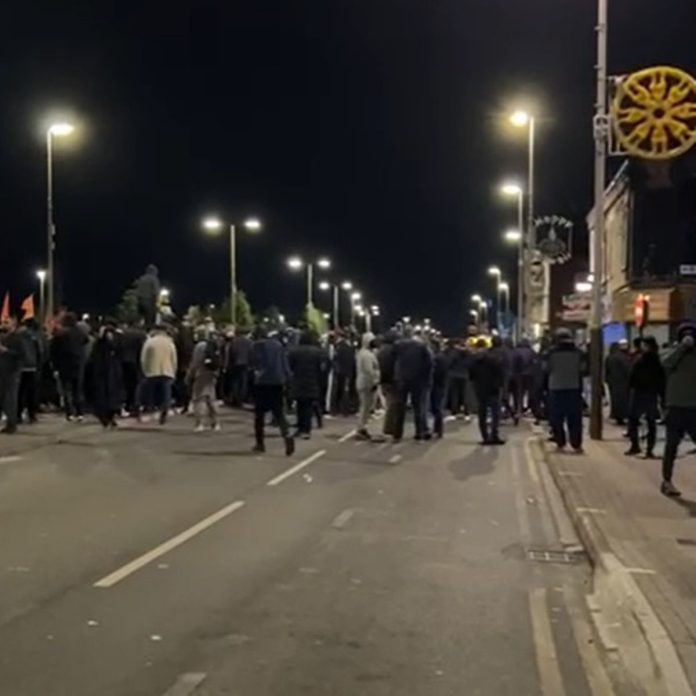For unity of working class and young people
Leicester Socialist Party
The recent violent disturbances between certain sections of the communities in Leicester, and now in Birmingham, are worrying. The high tensions between a minority of members of the Hindu and Muslim communities saw gang attacks and disturbances which reached a peak when violence broke out in Leicester between rival fans after the India-Pakistan cricket match on Sunday 28 August.
Following that incident the Leicester police brought in measures to extend their power to stop and search, and disperse anyone in the Belgrave, Rushey Mead and Spinney Hill areas. Stop and search is already notorious for its disproportionate use on people of colour.
These provocative measures by the police have further increased the tensions in the communities.
With tensions high, on the evening of Saturday 17 September, a 200-strong march took place of people who were widely believed to be Rashitriya Swayamsevak Sangh (National Volunteer Organisation – RSS) supporters. These men, who had their faces covered, were chanting abuse as they marched through the community.
The RSS is a far-right Hindu nationalist paramilitary organisation. It is affiliated with India’s right-wing prime minister Narendra Modi’s Bharatiya Janata Party. The RSS has been linked to communal violence in India against Muslims. The march entered the Green Lane Road area of Leicester. Green Lane Road in North Evington has a large Muslim population, but there is also a Sikh Gurdwara and a Hindu Temple in the same neighbourhood as well as other ethnic groups.
Although there has been serious disorder and aggression before, the violence on 17 September came from a small number of RSS supporters.
So what is behind this community strife? According to the Leicester Mercury, the City Mayor, Sir Peter Soulsby, who has carried through massive cuts in public services in Leicester including to the youth service, is “baffled” by the events!
It would be mistaken to think that the India-Pakistan cricket match was the cause of the disturbances. There are many factors, local, national, and international, that have fed the tensions that have simmered beneath the surface.
International factors that have contributed to the tensions arise from the election of Indian prime minister Narendra Modi in 2014, and again in 2019. Some Leicester leaders, including local Labour politicians, celebrated Modi’s victories, despite his party’s treatment of Muslims and other minorities in India, as well as vicious attacks on workers’ rights and the poor. Violence against minorities in India has increased since Modi became prime minister.
The protests have involved a small number of people so far but there is a danger that it could escalate.
Our working-class community has already suffered badly. Leicester had one of the highest Covid-19 infection rates and corresponding death rates in the UK, which is directly linked to the city having some of the poorest areas, chronic overcrowding and the scandal of the sweatshops. Leicester hit the headlines because of wage rates in the fashion industry of £3.50 to £4.50 an hour. The industry, employing 10,000 workers, kept working during lockdowns in unsafe, unhealthy factories, leading to Leicester being placed in lockdown when the rest of the country wasn’t. And companies like Boohoo, McVitie’s and Samworth Brothers made massive profits during the pandemic.
As with other cities, the Labour-led council has overseen massive cuts in public spending. Youth services have been slashed, along with social care and other vital services.
Nationally, we are facing the biggest cost-of-living crisis for years along with rising energy costs. The future for young people looks dismal unless there is a coordinated fightback.
The trade union movement is starting to show the way. The summer strikes of major trade unions like the RMT transport workers’ union, the CWU postal and BT workers’ union, and Unite have demonstrated how powerful ordinary, working-class people can be when they struggle together. The problems of soaring food and energy prices affects all communities and ethnic groups.
But we also need a political voice to fight the cuts in local and national services. Socialist Party member Tessa Warrington is standing for the Trade Unionist and Socialist Coalition (TUSC) in a council by-election currently taking place in the North Evington ward of Leicester, where much of the disturbances have taken place.
She is standing on a programme of no cuts, and for the council to take emergency action against the cost-of-living crisis – like opening up school kitchens in the mornings and weekends for free breakfasts and meals to be offered to all students – using its one billion pound-plus spending power to defend our communities. The council should spend what’s needed for the people of Leicester as its only priority – and mobilise a massive campaign for the government to pay if there is any shortfall in meeting the bill!
If elected, Tessa will also fight for a truly independent workers’ and community inquiry into the tensions between certain sections of the community, as the only way to rebuild trust and the unity of the working class and young people across different communities.
The Socialist Party resolutely defends the right of all to practise their faith, and opposes all oppression based on religion, race, gender and sexuality.
We also have no confidence that the police and the right-wing politicians will act in the interests of the community. The recent killing of Chris Kaba by police in London shows that, once again. The Socialist Party calls for the democratic control of policing by trade unions and communities, including with powers to fire-and-hire officers.
What is clear from these events is that a political voice is needed for the working class and young people in Leicester, and throughout the UK, as an alternative to the divisive policies of the current capitalist politicians. Standing in the local by-election is a first step to that goal which must be built on as the trade union and community struggle against the cost-of-living crisis unfolds.








